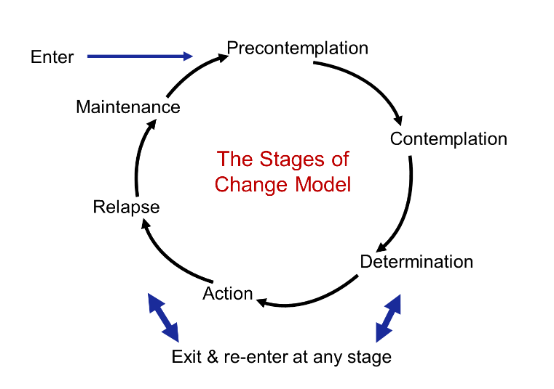Why do we put so much pressure on ourselves to be something/someone better on January 1 than we were on December 31? I get the idea that we can treat the New Year as a new opportunity but if you think about it, it’s just as arbitrary as making next Wednesday the day you decide to start something new. I get the idea of needing a mental start line when you’re doing something new but I’ve never really understood New Year’s resolutions. Besides that, how well do they actually work? I don’t do behavioral research and honestly I’m feeling too lazy to look up the stats right now, but anecdotally most people drop their resolutions pretty quickly. New Year’s resolutions set people up to fail, and probably end up being discouraging. Why don’t they work? I think part of it is the arbitrary decision to change something without actually being ready to change. This is where behavioral research IS important and I did bother to look some things up for you.

Schematic of the transtheoretical/stages of behavior change model
The readiness and ability to change behavior can be described by the stages of behavior change model.To summarize it, there are several stages that range from pre contemplation (you’re not even aware that you want to change something yet) to maintenance (you’ve made the change and maintained it for months). Depending on where you are mentally/emotionally in the stages, different interventions and strategies are useful to help you decide to change, how to do it, and how to maintain the change. One of the most important stages is action-actively making the changes necessary to reach a goal.
Ready, set….no.
Quit smoking! Lose weight! Start that exercise program! Society also puts tons of pressure on people to make lifestyle changes at the start of a new year, and there are lots of enticing specials on gyms and weight loss programs. These programs might be helpful for someone who’s ready for action, not so much for everyone else. The pressure of New Year’s resolutions force people in the earlier stages of behavior change to fast forward to action. This sets them up for failure from the very beginning. People don’t progress through the earlier stages and are not truly ready for change and are not fully committed-making the changes difficult to maintain, and they fail. Again, I don’t know the research on the effects of this, but it seems so counterproductive. I would bet that this failure pushes people even further away from truly being ready to change, delaying the point where they could actually be successful in the action stage.
If you really want to make a New Year’s resolution, your best option is to pick something you have wanted to change for a while (pre contemplation), have weighed the pros and cons of changing or not (contemplation), have already taken some minor steps towards making the change or are planning what those steps would be (preparation/determination), and use the New Year as the opportunity to implement the actions necessary to reach the goal.
If you really want to do something, why wait until the New Year? (aka My diet starts as soon as I finish eating this gallon of ice cream.)
Think of any time you really wanted to do something. Most likely you just did it. If that happens to coincide with January 1-great, but if not who cares? You can create your start line whenever you want, whenever you’re truly ready, and if it’s not on New Years you shouldn’t feel the least bit bad about it.